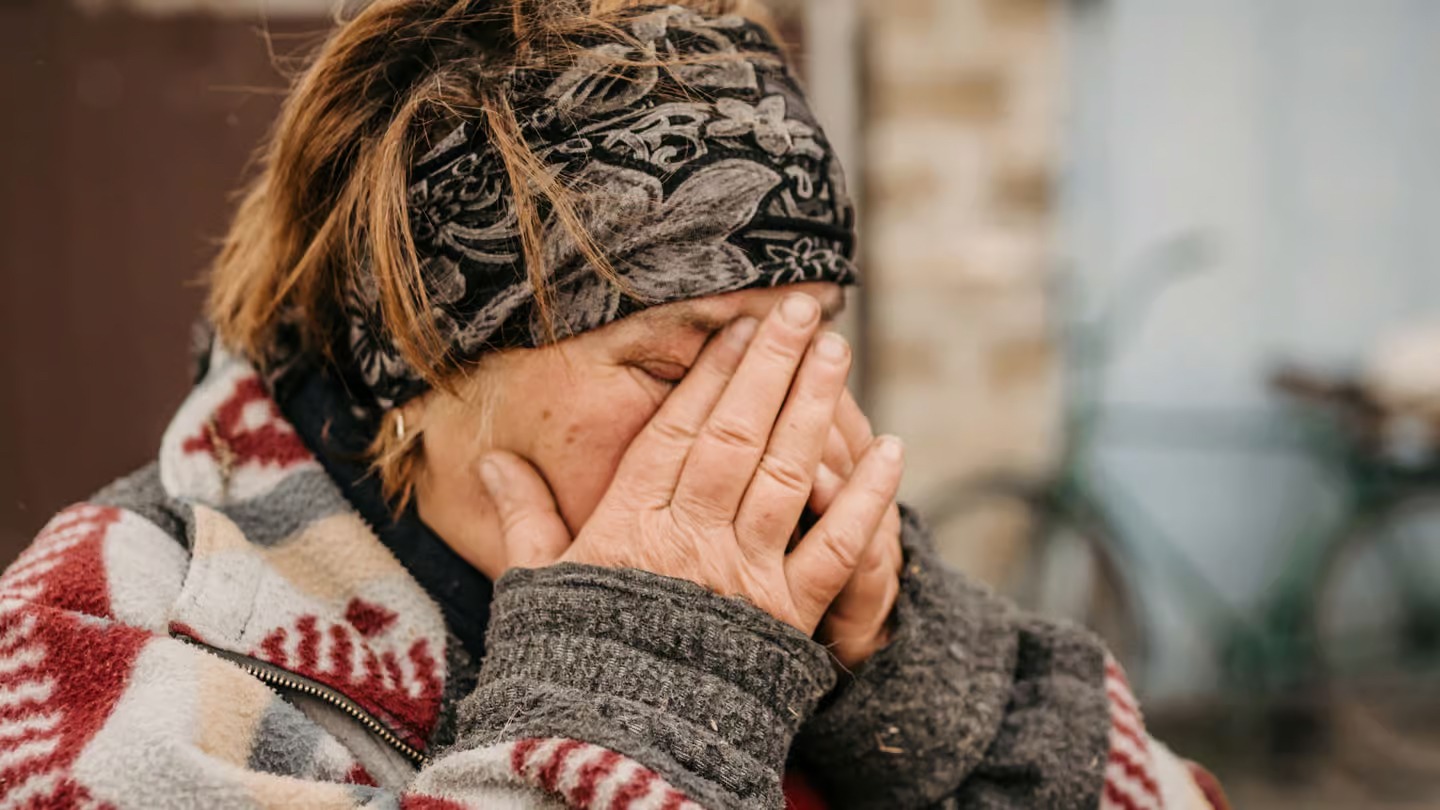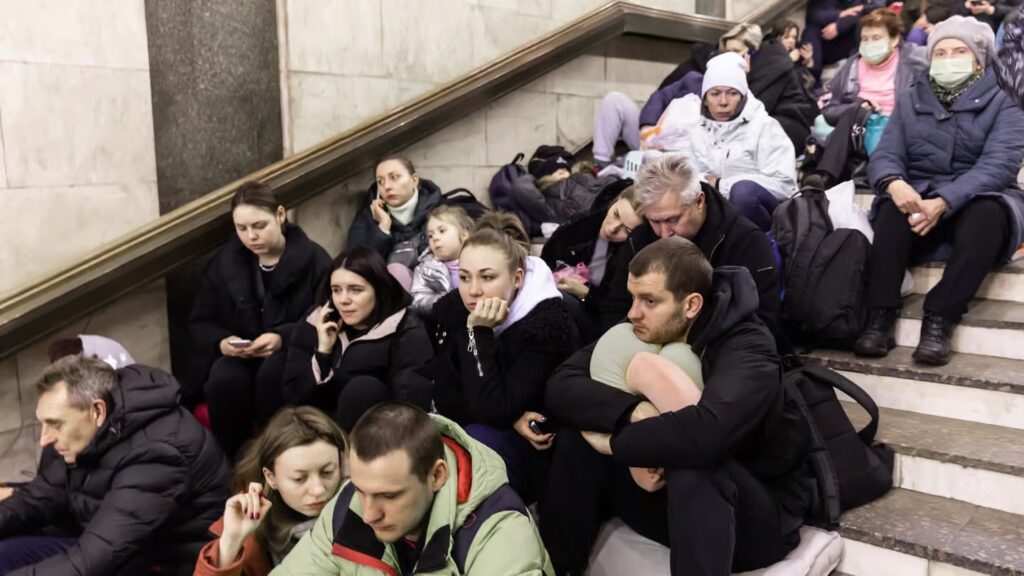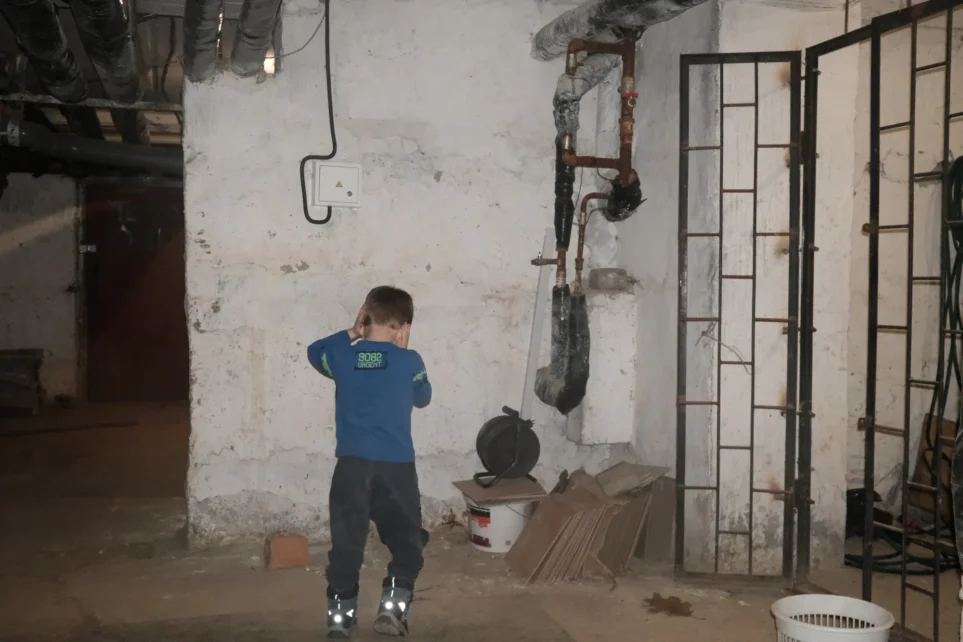Two years of war in Ukraine have mentally devastated generations

The psychological effects of the war are increasingly overwhelming. People of all ages are at risk – not just adults and retirees. Also, a huge number of children and teenagers suffer from tremendous stress.
Tetiana is well aware of the sound of bullets firing in the distance. Swish, rumbling, after which she and her family fled to the basement. Although from the beginning of the fighting, the word “basement” does not fit this place. There are pallets and mattresses, hay bales for comfort. “You could say we created peace for ourselves,” he says.
Located in the Kharkiv region, the village of Tetyanya quickly became a center of warfare. When the soldiers showed up, her husband began to fear that they would attack Tetyana or their two daughters, nine-year-old Diana and three-year-old Zlata. “It was an occupation. We were terrified, of course. But we held on for the sake of the children. Children are not shown fear. They themselves were so terribly afraid,” – he says.
One night, a familiar swish sounded closer than ever. Her father, who lived with them, went out to milk the cow, leaving the family in the basement. He thought the fighting had stopped for a while. At that moment, Tetiana’s house was hit by a missile. “It all happened so fast. Shrapnel hit three buildings,” the woman recalled.
She heard the basement door open and her father stepped out from behind it, spearing his injured leg. She applied pressure to the wound to stop the bleeding. The rocket left a gaping hole in the wall between the hallway and the bathroom. “When it started to rain, water poured into the room.”
After those events, Tetyana and her daughters fled to western Ukraine at the urging of her husband. They spent four months there. They returned when the home village was once again under the control of the Ukrainian government. Tatiana took care of the farm, and the children took care of their online learning. But it’s not easy – the village lacks jobs and a school. Perhaps they would detach residents from the war trauma.
Psychics are taboo
I learn Tatiana’s story through the International Rescue Committee (IRC), a humanitarian organization working on the ground in Ukraine. There are probably countless such accounts – last year Ukraine had 36 million people, 8 million fewer than before the war.
In response to the 2022 mental health crisis, the HEAL Ukraine Trauma (HUT) project was established in Ukraine, focusing on professional assistance for children and adults with war trauma. Last April, HUT published a report that highlighted the scale of the problem. Approximately one-third of Ukraine’s population may now be struggling with mental health problems, suffering from conditions such as depression, anxiety or post-traumatic stress disorder (PTSD).
Ukrainian women make up approx. 33 percent. of all internally displaced persons due to the war, which the organization says can promote the development of many mental health problems. More than 1.5 million Ukrainian children are also exposed to the psychological impact of the war.
However, mental health is still a taboo subject for many in Ukraine, especially among men. Dr. Alla, a doctor on the IRC medical team in Dnipro, believes Ukrainians and Ukrainian women are not used to working with psychologists. “If we take other countries as an example, there the psychologist is treated like a family member. In our country, people are afraid of psychologists. Once I tell them who the psychologist is and what they are going to talk to him about, then they respond: oh, it’s not so scary at all,” he states.
Alla provides medical consultation at an IRC-run women’s center. She argues that the trauma of war takes its toll not only on women’s minds, but also on their bodies.
“Imagine! The war has begun. The woman is under stress. A year has passed. And if she hasn’t gone to a psychologist, she starts having serious problems. I encounter that a very high number of cases of diabetes, early menopause, menstrual cycle disorders, primary hypertension are the result of stress. This is a very big problem for young women,” read her words in an interview conducted by IRC staff last spring.

I wonder if the topic of mental health has become at least a little more commonplace since then, amid a war that has lasted nearly two years. I call Anna Shyichuk, a psychological assistance coordinator with the Ukrainian Right to Protection organization, about the issue. – There has been a significant increase in the availability of mental health services, and numerous educational campaigns are gradually combating stigma. It is increasingly rare to find people for whom seeking a psychotherapist is considered shameful,” I hear in response.
Shyichuk adds that a narrative is developing in society that a nation’s mental health ensures its resilience in the face of aggression, which motivates people to work for victory in war.
Nonetheless, the needs are great and require comprehensive action, both by the state and by organizations and Ukrainians and Ukrainian women themselves.
Catching up
Ukraine’s psychiatric and psychological care system was not prepared for such a burden. Even before the Russian aggression on February 24, up to 30 percent. of the Ukrainian population suffered from mental disorders – depression, anxiety, alcohol and substance abuse, suicidal thoughts – of which only 1 percent. He was receiving psychiatric care. The trauma of the Soviet era, the ongoing conflict with Russia since 2014, and finally the COVID-19 pandemic, among others, have led to this scale of mental problems in the country.
According to HUT data, the Ukrainian government spends less on health care than its European neighbors – 7 percent in 2019. GDP compared to 10 percent. throughout the European Union. In per capita terms, the difference was even greater, at $250 in Ukraine, and $3,500. EU dollars.
Compared to Community countries, Ukrainians and Ukrainian women also spend significantly more on private medical treatment, despite their constitutional right to a free package of health care services.
The plight of Ukrainian psychological and psychiatric care is influenced by staff shortages and the destruction of medical infrastructure, among other factors. Hospitals have been targeted by the Russian military as a result of the hostilities. In 2022 alone, there were 707 attacks on Ukrainian medical facilities, and 218 hospitals and clinics were damaged or destroyed. There have also been 181 documented attacks on other medical infrastructure facilities, such as pharmacies.
The full-scale war, which began on February 24, 2022, has only highlighted the inefficiencies of the mental health system and put even more strain on it. At the time of the HUT report, Ukraine’s Ministry of Health predicted that 4 million people would need psychiatric medication and 15 million would need other types of support.
– The state system of access to psychological care is tailored to the population. For many IDPs, the system is completely overloaded and does not work, comments Anna Shyichuk. However, there are government initiatives that supplement the inefficient system.
“The Ukrainian authorities are trying to catch up with the mental health system. Olena Zelenska launched the national mental health program and campaign How do you feel?The Health Ministry has created an interactive map showing where to get help. Rehabilitation centers for soldiers are being established. Police officers, firefighters, teachers and family doctors are being trained in psychological first aid. The latter provided psychological assistance to more than 17,000 people in the first half of the year.” – we wrote last year.
But without the help of the international community, Ukraine will not be able to cope with such a huge challenge. Many donors and humanitarian organizations, like Right to Protection, make it possible to conduct free psychological assistance. These include offline and online therapies, support groups or crisis consultations.
Trauma at any age
People of all ages – not just adults and retirees – are vulnerable to the psychological effects of war. Also, an overwhelming number of children and teenagers suffer from tremendous stress.
– Young people face additional challenges in terms of socialization and life decisions, such as moving to another country for college or joining the military, says Alessandra Sacchetti, regional advisor for the National Council for Youth Affairs. mental health and psychosocial support at HIAS, a Jewish international social and charitable organization founded in New York.
According to Sacchetti, it is among teenagers that the highest rates of impulsive and aggressive behavior, social isolation and suicidal thoughts are observed.
– During the war, caring for a child or teenager became even more complicated. Caregivers told us how difficult it is to support children when you’re under stress yourself, and how difficult it is for parents of young children to access psychological care if there isn’t even preschool care, she explains.
The October 2023 HIAS report shows that the main sources of concern for Ukrainians are uncertainty about the future, family security, declining income and separation from loved ones. The reaction to stress is mainly sleep problems, sadness, worry and permanent fatigue. Most of the reactions manifest themselves among adolescents and young adults (up to the age of 30).
Young children are particularly vulnerable to stress, as the war quickly robbed them of their sense of security. They don’t fully understand what’s going on around them, and they can’t fully rely on their parents either, as they too are confused and uncertain about the future.
Internally displaced persons and refugees, both adults and minors, were particularly vulnerable. Moving and starting all over again, especially in a foreign country, is another source of stress and worry. On top of that, there is a language barrier to accessing health care. The latest research (published as early as 2024) shows a decrease in the severity of stress with an extreme increase in the development of PTSD among Ukrainian refugees compared to April 2022.
The emigration of children and young people from the country has deprived them of their previous bonds of friendship, and thousands of schools and kindergartens have been devastated, so that the number of places conducive to the socialization of the youngest has drastically decreased.
In Poland, I conducted a study myself, which showed that some refugee children from Ukraine feel alienated in their new school, and that the obligation to study and earn grades only worsens their mental state. On the other hand, the younger the children, the smoother the integration process and the easier it is for them to find their way in the new reality.

Looking for solutions
What should be the next steps in psychological support for the Ukrainian community? According to HUT, further education on mental health and the effects of long-term stress is needed – but at a more advanced level. “There is a need to share success stories, especially those involving men, and to raise awareness of the various forms that psychological help can take,” the report says.
It is also important to expand services to the villages to reach with psychological care wherever it is needed. This is where mobile teams, such as those organized by Right to Protection, come in handy.
– Simply put, a mobile team is a group consisting of a lawyer, a social worker and a psychologist that travels around different regions, cities and villages, providing assistance to the residents of these places. Often these are frontline regions or those suffering from the most severe consequences of the Russian war against Ukraine,” Anna Shyichuk explains.
Training for psychologists, nurses and social workers is also effective. Right to Protection psychologists support others in taking care of themselves and preventing professional burnout.
Finally, the actions of citizens and citizens themselves – support from relatives and friends and, in the case of refugees and refugee women, openness from civil society – are crucial. All this to help people now and to prevent the mental devastation of the next generations of Ukraine.



